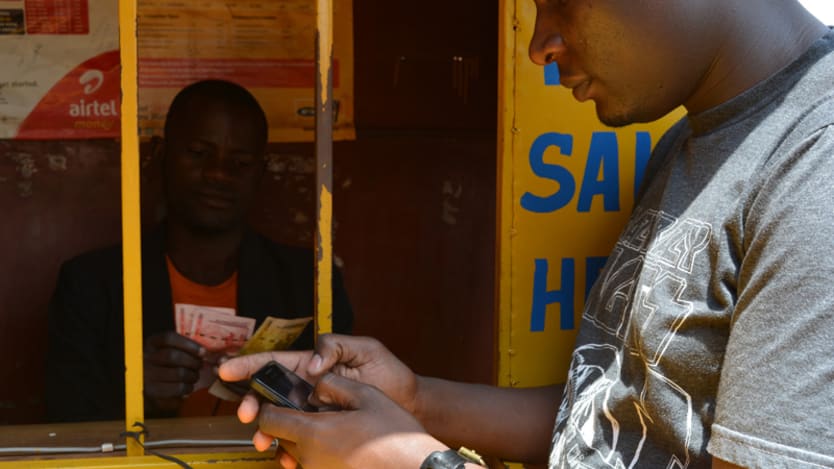
Mobile has the power to transform lives. It can reduce poverty and provide people with access to services such as health care, education and financial services, often for the first time. Right now, 4.7 billion unique mobile subscribers all over the world are benefitting from the social and economic advantages that mobile connectivity brings.
In this context, the mobile industry is leading financial inclusion around the world through the provision of mobile money. Mobile money is one of the most exciting innovations operating at scale. With more than 400 million registered user accounts, mobile money has done more to extend the reach of financial services in the last decade than traditional “bricks and mortar” banking has in the last century.
Mobile money leverages the ubiquity of mobile phones and the extensive coverage of mobile networks and retail infrastructure to offer customers a secure and convenient way to access, send, receive and store funds, contributing to greater financial access and economic empowerment.
As an industry, we understand that we play a critical role in contributing to the achievement of the Sustainable Development Goals. Specific to mobile money, we are committed to continue developing new and innovative products for underserved people who need them most. Mobile money already contributes to 13 of the 17 SDGs and is creating enablers to lift people out of poverty, drive economic growth and reduce inequality by 2030.
Here are three key areas where mobile money drives empowerment and financial inclusion:
Outlook: Innovation for the future
Since the establishment of GSMA Mobile for Development, our work has impacted over 28 million lives. By tapping into the game-changing advantages of mobile technologies, we expect this impact to grow exponentially and shape digital societies into the future.
With the success of mobile products and services reaching scale, the GSMA believes that more innovations are required. This is especially true around the sharing economy and small and medium-sized enterprises. This is why we launched the Ecosystem Accelerator Innovation Fund this year with the U.K. Department for International Development, to provide grants to startups in Africa and Asia active in utilizing the sharing economy, or creating services for SMEs; mobile-focused mentoring; and opportunities to build partnerships with mobile operators. An independent panel will select a dozen of the startups early next year and award a total of 2 million pounds ($2.4 million) in funding, with our first portfolio announced in March 2017.
1. Government payments: Digitizing government payments via mobile money offers benefits to governments, mobile money providers and citizens. Governments can increase tax collection and other revenue streams, through payments that are an important driver for the mobile financial ecosystem. Citizens benefit from a quicker, safer and more efficient way of making and receiving payments to and from government entities.
2. International remittances: The mobile money industry plays a key role within the global remittances space. Migrants often send money back home, providing a financial lifeline to their families, as well as contributing to the economies of their home countries by paying for health, education or investing in trade. Now mobile operators and fintech companies are providing alternatives, via mobile phones, that are more convenient and cheaper than the traditional models.
3. Mobile-enabled energy: Mobile money and Global System for Mobile communications, or GSM, remote monitoring also facilitate new access to electricity for those that live off-grid yet are covered by operator networks. Instead of paying for harmful kerosene, customers can make small payments by mobile money to use or buy a solar home system. The companies that offer these innovative energy services often use GSM machine-to-machine monitoring to remotely control and monitor these devices to carry out proactive maintenance and ensure payment for a sustainable service delivery model.
The GSMA Mobile for Development Utilities Program, funded by the U.K. Department for International Development, has funded several of these companies, such as PEG, EcoEnergy, Kamworks, Fenix, Lumos and Mobisol, contributing to rapid growth in this sector. There are now more than 650,000 pay-as-you-go solar home systems in use across Asia and Africa.
The ubiquity and commercial viability of mobile as seen in these examples proves that it is the only existing infrastructure capable of delivering digital and financial inclusion in emerging markets. Every day the GSMA works to bring to life commercially sustainable solutions driven by innovative mobile technology. Mobile money not only offers a key pillar that opens opportunities for utilities and SMEs, but fosters the growth of digital services that address the most prominent social and economic challenges of today.
Over three weeks, Devex will explore how the development sector can work together to promote inclusive local, and sustainable approaches to development. Global to Local will reimagine how to work together to address a myriad of interrelated challenges, pivoting toward more connected and crosscutting approaches to solving global problems. Join the conversation, tagging @Devex and #Global2Local.






